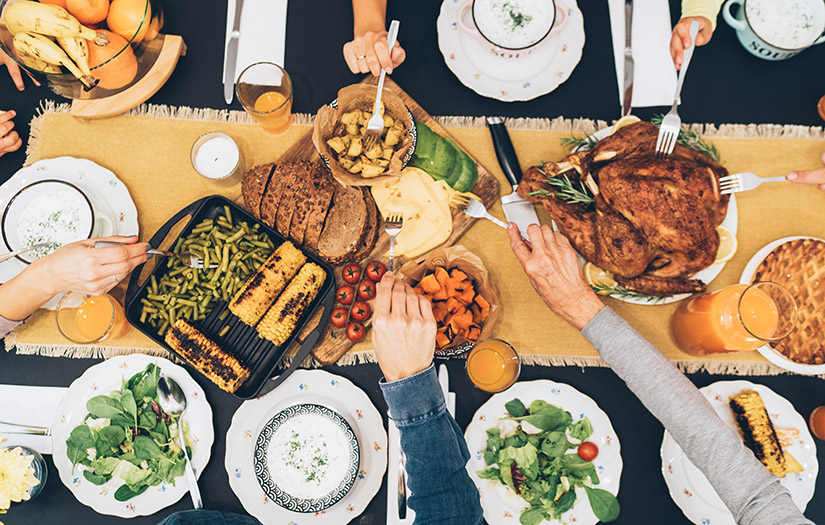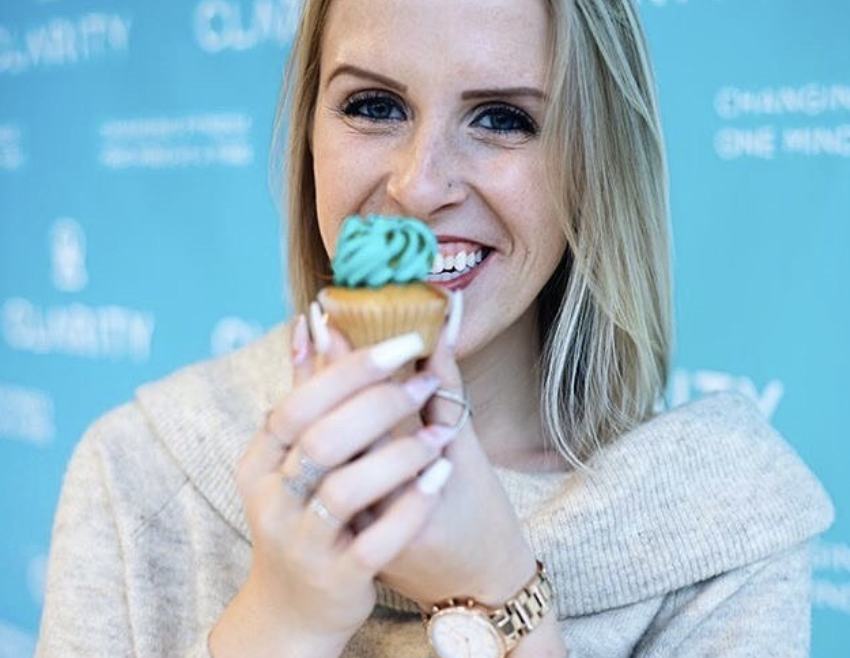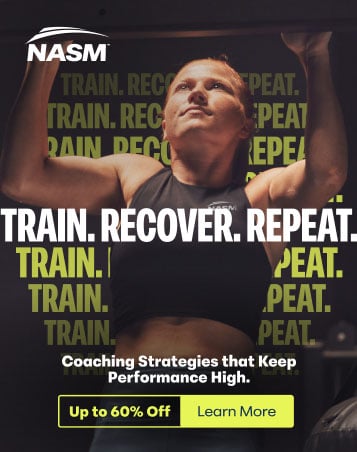As an eating disorder survivor, the holiday season can be scary. In early recovery days, my mental approach to the holidays looked something like this:
First, it was Thanksgiving, a whole holiday about food, listening to people talk about their diet plans and constant and compulsive thoughts about how I would "make up for" what I ate with workouts.
Then there was Christmas, filled with travel, tons of stress, powering through the end-of-year work before permitting myself to take time off, and more food. Just when I felt like I was at my breaking point, there was even more food and alcohol at the New Year. Was the universe trying to punish me?I was 22 years old before I could mentally check out of my obsession around food and exercise enough to understand the point of Thanksgiving finally.
I began to see that this holiday is an opportunity to spend time with my loved ones and honestly sit in gratitude for the year, my family, friends, blessings, and myself. It's not about the food; it's an opportunity to sit in peace, belonging, connection, and giving thanks. That's a big, beautiful, amazing release that we all deserve to feel!
Here are some ideas to help you to have an empowered, balanced, and happy approach to Thanksgiving and get present to what matters in the holiday season. These tools are not meant to replace or overrule anything you may be working on in therapy or your mental health journey.
If you're searching for resources for support with your relationship with food, movement, or mental health, NEDA, IAEDP, and HAES have great libraries of professionals. Community is everything!
Put Yourself in Someone Else’s Shoes
Think of a three-year-old looking forward to their favorite holiday. Instead of focusing on the excitement of seeing family members eating their favorite foods, they're focused on calculating macros, starving themselves to earn permission to eat, and pushing themselves through brutal workouts to release unnecessary guilt around eating. How does this story make you feel?
Maybe you have a broken heart for this imaginary three-year-old. Perhaps you wish you could hug the child and tell them it’s okay, that they don’t need to do all that to be healthy, and that they’re amazing, deserving of this break, and enough as they are!
Well, guess what? You are also just as deserving of that same patience, kindness, and permission to be human.
When you can think about your judgments, guilt, and frustrations being placed on an innocent child, your favorite pet, or a younger version of yourself, it helps to see how unnecessarily hard you're on yourself. While it might be a harsh wake-up call, you can then see the treatment you deserve and choose to step into that mental space instead!
Make It Fun!
Approaching the holidays with positivity and empowerment doesn’t need to feel fake. Having a plan with a family member to exchange a funny, side-eyed glance if a food, fitness, diet, or weight-loss related conversation rubs you the wrong way can be a fun way to bring light to an otherwise draining topic!
You can play an internal game of Thanksgiving Conversation Roulette and bounce around from one conversation in the room to another to stay in a headspace that feels right for you—starting to feel like you're in a funk? Jump to another conversation. Are you feeling okay? Stay with that conversation for a bit. Tune in to discussions on your terms.
Self-Talk – But Make It Intuitive
When you feel yourself starting to exercise before the Thanksgiving meal compulsively, maybe you need a loving but strong “Hey. We’re not doing that today.” Or if you feel you need a softer approach to checking into what feels good, maybe it's saying to yourself, "I hear you! We've got this. We're okay! You are safe."
Find those words that give you that release and remind yourself that you’re more than deserving of a time where you can soak up gratitude – guilt-free.
See also this relevant resource on self-talk. It's about athletic performance, but the principle remains the same!
Release the Need to Compensate
Here’s what we’re going to do our best not to do: “make up for” our eating by over-exercising, or “make up for” our under-exercising by starving ourselves. Try to think of movement and eating as separate pillars – not one in order to do the other. Fueling your body sustainably, flexibly, and in a way you enjoy is super important, and sometimes we eat a bit more than feels comfortable.
That doesn’t mean we’ve done anything ethically or morally wrong. Working out sustainably, flexibly, and in a way you enjoy is also super important. Sometimes, travel, unexpected situations, or a lack of a desire to do so changes things up. Again, you're not doing anything wrong for taking time off if that's what ends up happening over Thanksgiving.
Trying to compensate for changes in your fitness routine with food compulsively, and vice versa can be extremely dangerous and harmful to your body.
You Don’t Need to Delete the Gram!
Just be careful with it! When you’re beating yourself up for your self-care, food, or fitness routines, ask yourself what you've seen in the past 24 hours. Maybe it was a weight loss call to action on every magazine in the grocery store. Perhaps it was a transformation picture on Instagram or someone talking about their new diet or exercise plan. Maybe you just remembered something from long ago that’s been sticking in your head. When you can remember what might have started you on the path of being judgmental, you may feel more equipped to release it.
Remember, you can be aware of and intentional about what messages you take before, during, and after Thanksgiving. You have the option to clean out your social media by unfollowing or muting people that make you feel anything less than amazing before the holiday and all the time.
Do unto Others
In the spirit of community, consider thinking twice about the messages you put out on social media. Maybe Thanksgiving isn’t the best time to post about your workout calorie burn or share that before and after picture.
You never know who might see it or how hard they might be trying to manage their anxiety. Your decision to wait a bit to share those posts, or refraining from sharing them at all, may help others have less guilt to process.
Curiosity, Not Criticism
Have you ever looked at behaviors with curiosity…
“That’s that feeling of guilt around eating this cinnamon roll. Noted!”
…instead of criticism?
“I’m feeling guilty, so I must be doing something wrong! I absolutely shouldn’t eat this cinnamon roll!”
As humans, we train ourselves to take action on our feelings instead of allowing ourselves some time to sit with them and check them out. Ex: Guilt means you're doing something wrong, so you must stop. But in reality, sometimes that feeling of guilt creeps in without cause, and looking at what it's coming from can allow us to see if it makes sense.
Read this sentence, and then reread it: No matter what you eat, and no matter how much you relax before, on, and after Thanksgiving, you are not doing anything morally or ethically "bad."
Neither food nor rest can make you "bad." Neither food nor rest is "bad." Food is food, rest is rest, and assigning guilt to yourself for eating or resting is not a burden you need to bear.
Don’t Aim for “Perfect”
It's okay to try these ideas on for size and not instantly feel magnificent. You can make it through the holiday. It doesn't need to look or feel perfect.
Regardless of the shape and size of our bodies, relationship with food, or relationship with fitness, every one of us deserves to be able to release that internal guilt around not doing enough on Thanksgiving, and hopefully, one day once and for all. Let this blog be your permission slip to release, breathe, check-in, and do your best to enjoy.
You are exactly enough as you are, on Thanksgiving, the day after, and always.
If you want to advocate for others to relax and cultivate positive reflection towards nutrition, consider taking the nutrition certification course from NASM and changes lives one plate at a time.

















